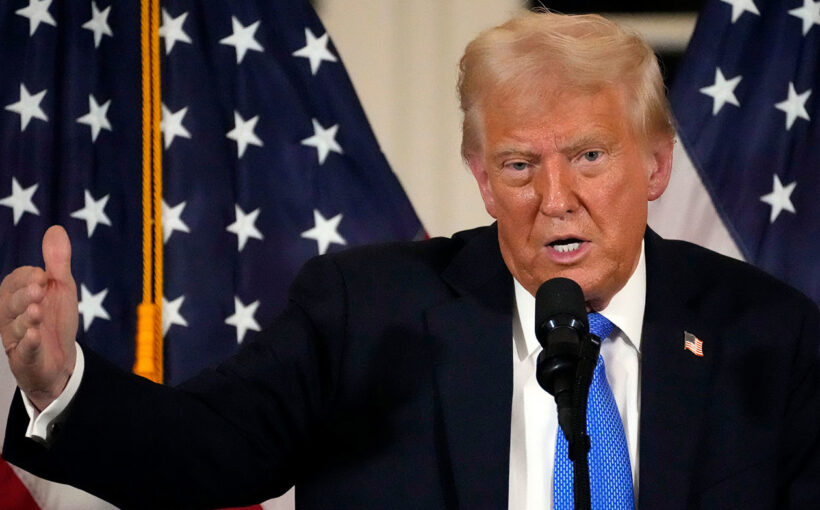When a new US president takes office, his first order of business is usually to reassure America’s allies and warn its enemies. However, Donald Trump is doing things differently. It seems his goal is to strike fear into the heart not of America’s foes, but rather its friends.
American presidents have traditionally seen the country’s network of allies as a “force multiplier” – something that magnifies American power and applies it more effectively. A broad range of allies means trading partners, military bases and diplomatic support in international institutions. According to this line of reasoning, it is in America’s own interests to defend and support its allies – the benefits outweigh the cost.
Trump, by contrast, views allies both as competitors and burdens. He thinks they are too reliant on American military power to defend themselves, and that their economic relationship with the US makes them rich at the expense of American workers. He wants US allies, particularly in Europe, to spend more of their own money on defence and to buy more goods from the US.
He also seems even more willing than in his first term to deploy America’s formidable tools of coercion to make this happen. His widespread threats of tariffs, for instance, are designed to force countries to go along with his wishes, including in non-economic aspects of the relationship. He is also threatening to use economic and military force in alarming ways, such as to seize control of Canada, Greenland and the Panama Canal.
The result is a world in which American allies can no longer rely on the US to be a reliable partner. They may increasingly have to fend for themselves against not just their traditional foes, but also a predatory Washington.
Although all US allies are concerned about this turn of events, some are more surprised than others. The biggest shock has come in Europe, which has long occupied a privileged place in America’s strategic thinking.
Europeans knew that a second Trump term was going to be rough. On the campaign trail, for example, he vowed across-the-board tariffs of up to 20%. But they didn’t expect Trump to threaten the territory of Nato members Canada and Denmark, which owns Greenland.
As a result, Europeans’ view of the US has shifted since Trump returned to the White House. According to the results of a recent survey by the European Council on Foreign Relations, the majority of people in Europe no longer see the US as an ally that shares the same interests and values, instead agreeing that it is only a “necessary partner”.
For other US allies and partners, particularly in the global south, this shift is less surprising. Panama owes its existence to an act of US imperialism. The US sent military forces to assist the country in seceding from Colombia in 1903, with the ultimate goal of working with the country’s new government to build the canal.
But Panama has since witnessed numerous American military interventions. Most recently, in December 1989, the then US president, George H.W. Bush, ordered 20,000 US troops to Panama where they toppled the government and arrested the country’s president, Manuel Noriega, on charges of drug trafficking, racketeering and money laundering.
Non-western countries have long been used to the idea that the US will disregard their interests and take advantage of their weakness if policymakers in Washington deem it necessary. What we are witnessing now is the extension of this precariousness to all.
Weakness for flattery
For world leaders looking to navigate this turbulent time, there is an additional problem. Trump has a habit of personalising diplomacy, deciding whom he likes and whom he doesn’t like based on their perceived friendliness to him rather than a more detached calculation of their interests.
He is also a sucker for big, splashy acts of diplomacy. He often gives the impression that his main goal is to be able to sign a deal – any deal – which he can declare to be a victory, rather than giving too much thought to the underlying interests at stake.
This means that smart leaders can flatter and deceive him. In early February, Trump postponed tariffs on Mexico after the country’s president, Claudia Sheinbaum, promised to send troops to the US-Mexico border to tackle the cartels trafficking the drug fentanyl in the US.
The only problem is that almost all fentanyl is trafficked by US citizens at legal border crossings, who bring in very small quantities of the drug in their vehicles. According to Raúl Benítez, a military expert at Mexico’s National Autonomous University, the “ant-like traffic of fentanyl” makes control of the trade “almost impossible”.
So, sending additional troops to the border will probably do very little to stem the flow of fentanyl. Trump declared victory anyway – and now other world leaders are studying Sheinbaum’s approach.
But the occasional weakness for flattery hardly makes Trump reliable.
Instead, Trump presents US allies with a dangerous and unpredictable force. Like the leaders of Russia and China, Trump seems to view the world as split into spheres of influence in which powerful countries are free to bully their neighbours.
Many countries will conclude that America is just another aggressive great power to be managed, rather than a country that at least pays lip service to international law. Some might even decide they have no choice other than to develop closer relations with Russia and China, and drift out of the US orbit.
One thing is clear: US allies must do more to ensure they can defend their interests independently. Unlike a country such as Panama, European countries have the resources to do this, if only they can summon the will. They should count themselves lucky – and get to work.
![]()
Andrew Gawthorpe does not work for, consult, own shares in or receive funding from any company or organisation that would benefit from this article, and has disclosed no relevant affiliations beyond their academic appointment.



